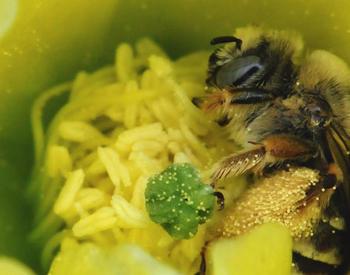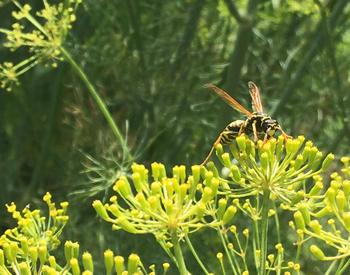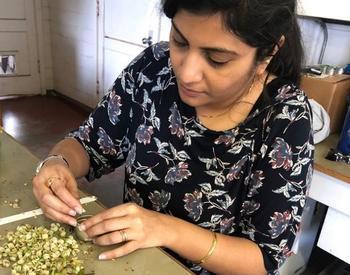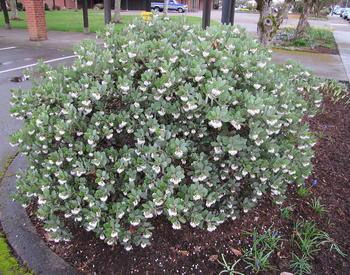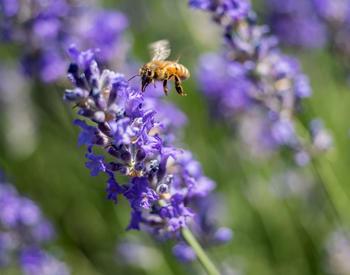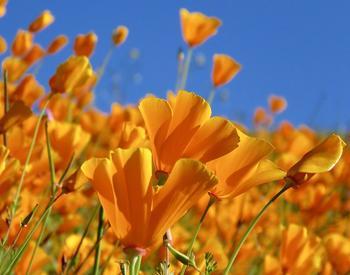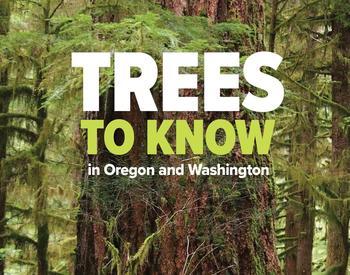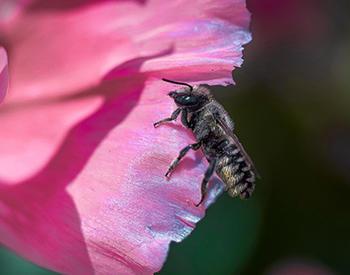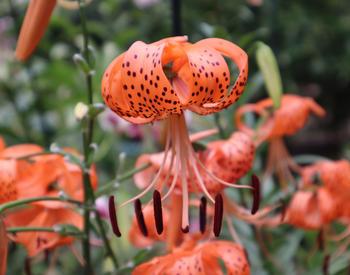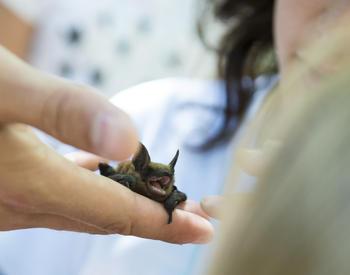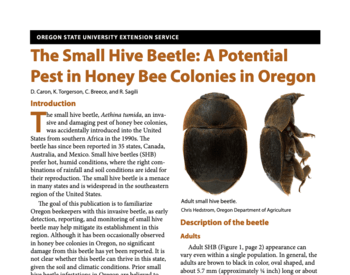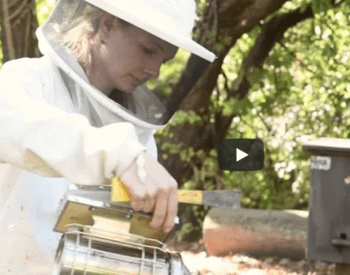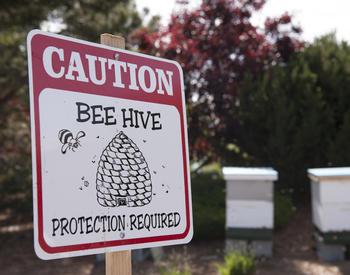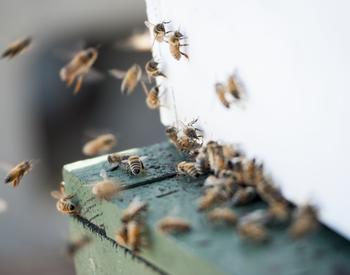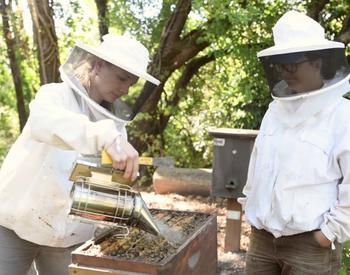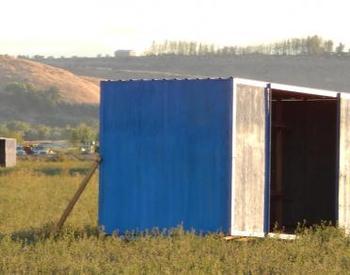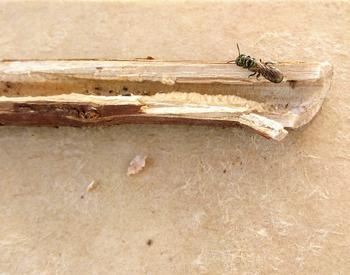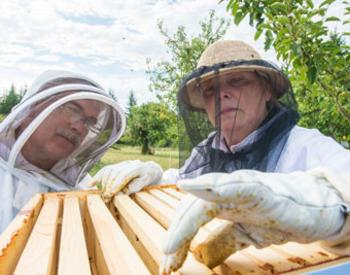Transcript
Speaker 1: From the Oregon State University Extension Service, this is Pollination, a podcast that tells the stories of researchers, land managers, and concerned citizens making bold strides to improve the health of pollinators. I'm your host, Dr. Adoni Melopoulos, assistant professor in pollinator health in the Department of Horticulture.
Okay, listeners, we are launching a new series today. Between now and next National Pollinator Week in June 2018, we are going to be featuring Oregonians who really have gone the extra mile towards helping pollinator health. This is part of a larger initiative in the state called the Oregon B Project, which involves a lot of different groups but is headed up by Oregon State University, Oregon Department of Agriculture, and Oregon Department of Forestry. We're working together to get better resources out to people, to do training for people like pesticide applicators, but also linking people together.
That's a really big goal of ours. In our first profile, I thought this seemed like a great opportunity to catch up with Alan Taransky of Glory Bee. Many of you know Glory Bee. It's a nationally renowned brand. It started as a honey packing company, bee supply, but it's really expanded considerably since then. One thing that they've kept in mind that whole time is a commitment to sustainability and pollinator health. In 2017, for example, they were in the top 100 businesses in Oregon in terms of sustainability. But recently, they launched this program that you may have seen on the shelves, the Save the Bee program, where proceeds from each sale go to pollinator health.
It really does. It's supported a lot of research here at Oregon State University, as you'll hear in the program. But also sponsoring scholarships for beekeeper training. It's a really great initiative.
I thought this was a great chance to profile a real leader in pollinator health here in Oregon, Alan Taransky. Okay. Well, I am so excited to be sitting. I'm in Glory Bee right now, and I'm sitting across from Alan. Welcome to Pollination, Alan. Thank you.
Yeah. So, Glory Bee, everybody knows if you're in Western Oregon, you're a big bee supply company. Also, pack a lot of hive products and retail them. So you're a business that is invested in the health of honeybees. But what's really remarkable is that you've reinvested back into pollinator health through the Save the Bee program. Where did that idea even come from? When did it start and how did you come up with this idea of Save the Bee? Yeah.
Speaker 2: Well, I think it started with one of our core values is stewardship. And so we believe we're just responsible for what we have the opportunity to impact. Hearing about this colony collapse disorder and the plight of the bees and the beekeeper just became of big concern. As I contemplated our role in the industry and our community, I didn't really feel like selling honey and beekeeping supplies was enough. We needed to be a part of the solution, not just a part of the industry. So the idea just came that if we promoted saving the bee through our brand and our company, we could become a part of the solution.
Speaker 1: I think we were talking earlier, you started the initiative in 2012. So it has been a short period, but the logo, the Save the Bee logo is really, you see it on supermarket shelves in many ways.
When people pick up a jar of honey, it might be their first introduction that there is even a problem with the bee. So it's like a very public way of bringing awareness to the issue. And I wonder when you started, when you were sitting around thinking about this initiative, what did you have as goals? What did you think, this is accomplishable? We, given our role as a company, this is what we could conceivably accomplish. What did you have in mind then?
Speaker 2: Yeah, great question. I think what I had in mind was that we could bring a lot of awareness to bees. I grew up as a beekeeper and around honey. And one of the things that I will never forget about my childhood is that people would ask for regular honey. And I didn't know what regular honey was because, to me, honey was always connected to a floral source.
And what did they mean? Or an area. And they meant clover honey. But I knew there was blackberry honey and buckwheat honey. And so to me, one of the goals was awareness. And so one of the things that we did on our honey labels is we put the floral source, you know, of the honey on the honey labels. And then as we brought in Save the Bee, it was trying to connect people to the fact that this isn't just some obscure product that comes randomly from anywhere. It's in your backyard.
It's in your area. It's from a crop, you know, that bees are doing more than just producing honey. They're pollinating and how important that is. So awareness was a big deal.
Speaker 1: And I have to say, it's one of the few brands I've seen where that it's really, I'm from Alberta as listeners know, and the Montana clover honey is as close to home as I can get. But I love that it's there. It's there's a really great, beautiful line art of the flower and the resource on the front. And it's one of the brands where you do make that connection with the state and with the floral source. It's really, I think a lot of people don't know that.
They're just the regular honey is that kind of stereotype of amberish color that everybody's blending to, but they don't know. I think that's great. So that's when I first came to the state and go to the, went to the shelves, I was like, oh, that's really cool.
Speaker 2: And, so in addition to awareness, which is so key, it was to, to raise funds to support research, to support education and, and improvements in beekeeping industry and really in farming. And so those were some of the early goals that eventually were able to quantify and, and, really set some particular benchmarks or milestones that we wanted to achieve. But really at the beginning, those were the two, two tenants of what we're still trying to do today is, to raise awareness and expand awareness and, and raise support.
Speaker 1: You know, I, I'd like to talk a little bit more about those goals. And we were having a conversation before here about, I mean, the research is one thing that, you know, Glory Bee has contributed considerably. When we look at the research that's happening at Oregon State University, Glory Bee has been right there in stride supporting the research lab, the Honey Bee Research Lab. But you've also been supporting the training and it strikes me in just the history of Glory Bee. There is this kind of connection to training new beekeepers. Tell us a little bit about that history and some of the initiatives around, you know, how you're supporting training through the Save the Bee program. Yeah.
Speaker 2: Well, our mission statement includes educating people about healthy living, and we think healthy living is a, you know, a mind, body, soul, spirit, and certainly, you know, beekeeping is a part of that. And really that, that part of our history that, that comes to life really comes from, from my father who, in fact, how he grew the business was teaching a class at Lane Community College to over 80 people in 1975 for 10 weeks.
The class was so big that the first week it was canceled to move to a bigger room. I grew up actually helping my dad, assisting him, in some of these beekeeping training classes. And so it's a tradition we've kept for 43 years here in April every year. We sell packages of bees and we do, you know, a very brief 101-hour-and-a-half demonstration on keeping bees. But we also offer some classes prior to April and, and to help people become educated. So I think we just think it's really important, not only is it fascinating, but it's important to gain knowledge in your craft. And, you know, beekeeping is, to me, a beautiful balance between art and science. And the best beekeepers for sure are very knowledgeable scientifically, but they also just instinctually are in tune with the bees.
Speaker 1: A hard thing to train, but it always, and I imagine a lot of people have gotten their start here. Beekeepers who are really successful or really kind of prominent in their community may have gotten their first package from a place like Glory Bee. That would have been their first, that first kind of conversation they had to where they kind of launched into becoming a beekeeper happened in a place like this. Yeah.
Speaker 2: Recently I was at the Oregon State Beekeepers Association conference and got to talk to Charlie Mock and he's been in the business for a long time since I think the early eighties or late seventies. And he took a beekeeping class for my dad and was telling me that. So yeah, a lot of beekeepers, we've had the fortune to be an introduction to a lot of beekeepers who, you know, are still beekeeping today.
Speaker 1: Well, and that, that comes to the Save the Bee program. So one way in which you've reinvested the revenue from the program is to provide scholarships and to support the Oregon Master Beekeeping program. Tell us a little bit more about that decision and, you know,, what those investments look like. I think I've talked a little bit about it, but put more meat on that. Yeah.
Speaker 2: Well, first off, hopefully, people know that the Oregon State Master Beekeepers program is, is one of the best, if not the best programs in the nation. So we're very fortunate here in Oregon to have a fantastic beekeeping program like the Master Beekeeper program. And beekeeping, like farming, you know, is facing an aging out of some of the key stakeholders of the industry over the last, you know, 30-plus years. You know, so we're facing who's going to be the next generation of beekeepers. And that's something that whether we're talking about stewardship over the environment or training up the next generation, it's about future generations and keeping that in mind. And so I think the Master Beekeepers program is a fantastic way for us as a part of the Save the Bee campaign to support educating and training future generations.
Speaker 1: It does raise this issue. There's one, you know, there is, you know, one, I guess, hope is people who are going to begin as a hobby as your dad did, will take this up. I mean, it's impressive to think that Glory be started as a beekeeping hobby that it has expanded. But the other thing is, I guess, you know, there is this real need for commercial beekeepers, like that is a different set of skills that requires business management, it's going to require, you know, a whole host of things beyond beekeeping. And that, that strikes me as a real kind of need that we have these programs that do serve introductory beekeepers, but kind of training up the next generation of like innovative beekeepers, commercial beekeepers is a real challenge.
Speaker 2: Oh, absolutely. I was meeting with some industry members in the natural foods industry, which we're a part of recently about the concern and gap over people getting into again, farming and beekeeping as a commercial business in the future.
And that is a real concern. And, you know, one of the things that Oregon state is partnering with commercial beekeepers on is putting on a commercial beekeeping training program. And glory be had the fortunate to attend that here recently and provide some, some training to the beekeepers around honey quality. And I think that's all just so important. We, there are other solutions we need to come up with. So as we raise awareness and support, we really need to take a hearty look, which is already being done, but to further the next generation of commercial beekeepers.
Speaker 1: Yeah, because it's not like the beekeeping of a generation ago like we have food safety issues, you've got integrated pest management, you've got this really kind of crazy pollination cycle. It's a very complicated business.
Speaker 2: Yeah. Yeah. My dad,, who's a hobby beekeeper today, and not a commercial beekeeper jokes that in his first year in business, he had a five-week vacation and never since. And I think if you talk to if you talk to these commercial beekeepers today, they don't get a break. Right.
And if they do, it's a real short break. So it's, it's a very different environment than, then 30, 40 years ago for sure, in terms of being a commercial beekeeper.
Speaker 1: I want to come back to save the bee for a second. We'll take a break, but I did want to talk a little bit about partnerships. What has been really impressive is, you know, well, maybe we need to start by just saying how the Save the bee program works. Like when somebody goes and buys, like I do, goes and buys their Montana clover honey off the shelf, what happens then?
Speaker 2: So 1% of the sales of glory bee honey and honey sticks and, and beekeeping supplies goes directly to save the bee. So all that money is, is part of what we donate to save the bee. You know, then what we do is, is we figure out how we want to invest that money, you know, to further awareness and research and support. And so, you know, we've picked OSU as, as our primary partner. We've recently started supporting, you know, some other entities in small ways, but really Oregon state has been such a leader in the country in this research. And so it's been a perfect fit because they're right in our backyard and, you know, part of, part of our community here in the state of Oregon.
Speaker 1: Well, it's a really great connection between an Oregon business and an Oregon Lang University. But there are also things like the 5k run. So there are, there are these engagement opportunities. Tell us a little bit about that. And then I want to ask you about all these other people who are aside now.
Speaker 2: Yeah. Well, really, what happened is after a year into this, and, you know, of course, a year wasn't very long, but I had some big ideas and big goals. you know, I realized quickly that we weren't going to make enough impact ourselves. And then I think upon reflection, realized that we shouldn't really be trying to tackle this ourselves, that this is something we all need to be concerned about.
Yeah. Because bees and pollination and healthy food are something that should be important to all of us. And so that got the wheels turning about how do we create awareness. How do we get other people involved?
And so my sister and her team, they launched the Glory B 5K and we've gotten sponsors and we've hosted a race and we've raised like $6,000 every year, you know, on a 5K here in Eugene. What is it? It's in late April.
Speaker 1: Okay. Yeah. I can't, I don't think I could run 5K.
Speaker 2: Well, you can train for it. You've got enough notice now that you have to train for it. So we want to continue to do those things to raise awareness. And then that's where we really started getting into the idea of how we create partnerships around Save the bee.
Speaker 1: Okay. Tell us about that. Cause that's really exciting to me. There's a long list of people in Oregon elsewhere that you've been able to bring on board with this. Yeah.
Speaker 2: So we've created, like you said, numerous partnerships, and some of them are co-branding partnerships. So we've actually had companies like Tillamook Yogurt launch a save the Bee yogurt in their farmhouse Greek-style line of yogurts, which you can buy at the stores. Franz has launched a Save the bee bread. We've had bakeries for a month, baking products made with honey that go to save the bee. We've had stores run promotions and companies like New Seasons now have six items in pre-pack bulk that go towards Save the bee. So small partners, and large partners, creating awareness, but also supporting the cause financially. And, you know, what to me is kind of astounding because it's not glory bee alone.
And's the whole point is that this community that's gotten behind Save the bee together with Glory Bee, we've raised $270,000, since we started. That's amazing. And it's still growing. So the amount of awareness we've created and the amount of money we've been able to raise is fantastic. And I'm super thankful for all of our partners.
Speaker 1: And I, we had a conversation about this as well that, you know, one of the goals is not just to raise money, that you're also looking to sort of have influence on, you know, what, what those products are like. Yeah.
Speaker 2: Yeah. So we want to make sure because honey is pure and natural that the bees make that any product that's going to carry the Save the bee identity is also pure and natural. And so we've partnered with our customers and those who may need to tweak a recipe or change an ingredient or something like that. You know, we've had those conversations and, you know, what's been amazing is I think both because of the concern over the bees and the partnership and the relationship that we have is those conversations have gone extremely well.
And if needed, those changes have been made. And so we're putting out a product and they're putting out a product of integrity that represents both their brand as well as save the bee.
Speaker 1: That's great. It's and I love the logo too. The whole packaging of it is just really kind of appealing. It really drew my eye when I saw that bee on there and it was just like, that is, I want to know more about that. Yeah. Well, let's take a little break, and then we'll come back and talk a little bit more about I'm actually, I'm really kind of curious about what you do here. So let's take a break and we'll come right back.
Okay. We're back with Alan and I thought this would be a great opportunity. We've really not had any shows talking about this wonderful product that comes out of a hive and you deal with many products. And so just run us through like what happens? How does, you know, when honey comes out of the comb, like how does it get into a jar? Yes.
Speaker 2: That's a good question. Well, so for those who aren't beekeepers, you know, the bees cap the cells that are filled with honey with wax. And so to get it out, you got to uncap that.
So you know, the kind of old-fashioned way as a hot knife to, to pull that cap off. And then you put those frames in an extractor and you, you know, extract the honey and then, you know, that contains some wax and maybe a bee flu in there and a chunk of propolis and all that. And so you want to strain that out. So for those backyard beekeepers, you know, after it comes out of the extractor, you want to run it through what we call a double sieve and strain out those things or you may want to, maybe you don't want to. And then from there, you can bottle it.
Speaker 1: And so from here, so you're getting honey, it's already been the wax separations taking place and you're getting bulk honey. And so when that bulk honey, how does it, when it rolls in through the door, what do you do then?
Speaker 2: So being a commercial honey packer that's selling products to end consumers, we have to have quite a process to make sure that everything is of great quality. So that means checking the drums to make sure they're labeled properly, making sure that the drums weren't used previously for something else, like an allergen. When we sample and inspect the honey, we need to make sure that there's, if there's wax that we're able to scrape the wax off the top, so it doesn't clog what we strain. And then we send it out for testing. We make sure that it passes a purity test, passes any antibiotic testing. That's required by law. So those are the things that we do before we ever process it. Right, okay. And then from there, we warm the honey up and get it liquid.
Speaker 1: Because I imagine in a lot of these drums, it's just solid in the drum.
Speaker 2: It's as hard of rock honey. Yeah, well, we've, you know, in the United States, essentially, and where we buy from, we've got one honey crop a year, you know, and so sometime throughout the year, you're going to get honey that's crystallized. So I would say, you know, 70% of the honey that we're handling is crystallized solid drums. So yeah, we've got to liquefy the honey. We got to warm it up and liquefy it. And then we make sure that as it goes through magnets and as we strain it, there's no chance of anything from a food safety risk.
Speaker 1: Of course. Yeah. And so, okay, so you've got this big, I imagine this a big hopper full of honey, and now you got to put it into packages. And I guess there are things that we're familiar with, like just a jar, but you also have been involved in honey sticks. Yes. How's that done? How do you get honey into a straw without making a mess?
Speaker 2: Well, the gentleman that gets credit for all that, I can tell you how he started, which was taking one of those old honey bears with the narrow top.
Speaker 1: No. And hand-filling straws. And heat sealing them. You know, and that was how he guys started selling honey sticks and then, you know, figured out how to automate it. So he invented a machine that was a patented machine that he invented to fill these straws full of honey. I'm sure anybody, any beekeeper who's done tabling, going to a farmer's market, these are really invaluable tools. You can, I think I really love the honey sticks you can get a whole lot of flavors. So if you wanted to introduce the public to the quality, the different types of floral honey that's out there, this is such an easy tool to be able to convey that to them.
Speaker 2: Oh, it's fantastic. And to me, I grew up with honey sticks. I sold honey sticks at my school and I've been a part of creating some of the 20-plus flavors that we have here at Glory Bee today.
Speaker 1: You have 20 flavors? Yeah. I'll tell you some of the flavors. So we have floral varieties like buckwheat wildflower or blackberry blossom. But we also have things like sour apple and mango and pico lemonade and root beer, root beer, which gets some really good reviews for the flavor. People really like the flavor. We've had some that have come and passed like that special edition of ice creams that you don't get anymore. Like pina colada was one that we had and it was really good. So we have an amazing array of wonderful flavors of honey sticks and they're all natural colors and flavors, so nothing artificial is added to the pure honey.
That's awesome. Okay, so we've got the honey, we've got it in these various containers, but we were left with this wax that we separated off. So one thing I've, you know, I was out in the showroom looking at like the candle supplies and it was like, how does, you know, where does the wax come from for making candles? Yeah. Is it just any wax or?
Speaker 2: Well, so we have two grades of wax. We have a, you know, a cosmetic, you know, and candle grade wax and kind of a food grade wax. And so, but we also sell filtered wax.
So beekeepers, depending on their operation, their size of the operation and their ability to segregate their wax, some of their wax is capping wax, which is usually light wax, and some of its darker wax. So we grade all that out. And then if, if, somebody can buy unfiltered wax, but they can also buy filtered wax. And so.
Speaker 1: I've seen some of this filter wax too. It can, it can be turned like ivory. It can be very, very white.
Speaker 2: And we don't, our process is not a process that does that, but that is possible to naturally bleach the wax. Yeah, I see. And so it can be done in the sun actually. But we filter it, strain out any of those particulates and things that, you know, you don't want in your, in your beeswax. And so, yeah, I mean, it still has a great smell, you know, of course. And beeswax is an amazing product. It's used on more things than you know. Okay.
Speaker 1: Give us, give us something that you might not think beeswax is used in.
Speaker 2: Well, I think one thing that I guess maybe the average person doesn't even think about is polishing, you know, leather shoes, coating your wooden furniture. I mean, I went to an Amas store, my wife and I were looking for a dining room table and, you know, what's one of the options? Well, if we don't want to get a stained table, they treat it with beeswax and lemon oil.
That's, that's it. I mean, you know, so it's pretty amazing to think that, and it's still a great, you know, lip balm and all those things. Beeswax is amazing, like a lot of the products of the hive. Okay.
Speaker 1: Well, thanks so much for giving us a crash course in hive product processing. We really appreciate it. Let's take a break and we'll come back and we'll talk. I've got these questions that I ask all my guests. We'll come right back. Well, we're back. I've got these three questions. The first one is a book. Is there a book that you would recommend? Do you really love this book?
Speaker 2: Well, I'm kind of a natural organic guy and I really, really have enjoyed natural beekeeping by Ross Conrad.
Speaker 1: Oh, it's been recommended before on the show. Great. Tell us a little bit about why you like the book.
Speaker 2: Well, I think that you know, when we think about how things are done today and in, you know, our backyards or, you know, our gardens or things, there's so many things that we've created to just cast over how you should treat bees, you know, or how you should treat your vegetables or things like that. And so we tend to just want an easy solution. So we'll spray stuff or whatever. So with bees, one little simple thing is like Ross talks about that you don't need to oversmoke your bees.
Speaker 3: Oh, right. You just need a little tiny bit. And, you know, new beekeepers, right? They just, they're nervous and, and, and, and scared and, you know, lots of smoke. So I think just his understanding of how bees really operate and then maybe how to approach beekeeping from a natural organic, you know, the method is what I really like. And the fact that you can take away those simple things that, you know, make sense and just apply them to your beekeeping practice.
Speaker 1: So that's really great. And I think, you know, sometimes when you're, you get started, you must think, oh, man, I need all this stuff. I need like a little and in fact, you know, in some ways there's nothing, no substitute for actually just kind of like starting to work bees and getting the experience and all of those things.
Speaker 2: Absolutely. I mean, my, you know, I grew up beekeeping, took a long break and started beekeeping, you know, again, about 10 years ago. And when I started up again, you know, I was kind of like starting all over.
And of course, I had a great mentor and my dad, but that first year, you know, you're just learning a lot and it helps to have a mentor, but it also just helps to let it come to you and not try and like you said, do too much, you know, all at once.
Speaker 1: Well, it reminds me of something we said earlier. You were saying, you know, beekeeping is science and art. It's not, you can't just learn all the facts and go from there. You have to exercise judgment.
You have to build that up over time. And that a really great beekeeper is somebody who, you know, how did you put it? You said something like need to know their facts, but they're
Speaker 2: just, they're, they're following their instincts because they know their facts, but they also know bees.
Speaker 1: Well, that's great. And that brings us to, you know, an instinctual beekeeper's tool. Is there a tool that you find indispensable and you really love or it might even be something that you just, people don't kind of underestimate?
Speaker 2: It's like a real, you know, there's some, there's so many great tools. You know, I really love the J hook, you know, hive tool. You do. Uh, yeah. Just because it's got a nice sharp blade, you know, to get through the propolis and then just to be able to, to, you know, pry those, those frames off, you know, especially certain times a year when the propolis is thick and sticky and, and whatnot.
Speaker 1: I have to say now that I'm in Oregon after being in Alberta, they stick those frames together good down here.
Speaker 2: They do. They really do. They really do. Probably my favorite nontool is to not wear gloves. Ah, great. Because I, uh, my first year I wore gloves, and I just felt like I was fumbling the frames around and I was disturbing the bees more and I'd finally just ditched the gloves and never gone back because I'm able to be gentler with the bees without the gloves.
Speaker 1: You know, it strikes me as one of the things that beginners have the most trouble with is getting that first frame out and like that J tool is good for getting it out, but there is a way if you're using gloves, like is that last inch before that hits the box, you drop it a little bit. And if you have your, if you're using your fingers, you just have that much more dexterity to kind of
Speaker 3: move around and things don't get jostled. Yeah. Yeah. Okay. Our last question is favorite bee and this can be a wide range of answers here. What are your, what are yours?
Speaker 2: Well, I'll start with, I guess my favorite bee experience, which is my first beehive here in Lane County. My dad had about 20 hives at the time after he had sold off his commercial beekeeping operation. And he gave me a beehive to start a season, and that beehive was stacked so high and produced 160 pounds of blackberry honey. And it was just, you know, an incredible way to start beekeeping. So as a young boy who was enjoying the bees and then had all this honey to pack and sell, I just thought it was amazing.
Speaker 1: Must have just kept coming and kept coming, kept putting boxes on.
Speaker 2: Man, it's full now. So they were great bees. The weather was great and the location was great. So it was just one of those very rare instances here. So that's my favorite probably beestory introduction to bees. I really love drones because you get to introduce people to bees who are apprehensive and just say, Hey, they don't have a stinger and put them in their hand. And right. That's how I introduced my kids as children, young children to bees. And my children now do it with other children. Oh, do they?
Speaker 3: They ask to catch a drone or get a drone or they catch a drone out of the hive and they'll have their friends over. So I just think for children and adults alike where the idea or the trauma or this being scared of getting stung, drones are a great introduction. And they're the tip of the iceberg for sure. Because with the workers and the queen, there's so much more that goes on.
Speaker 1: But at least you can get over that fear. But getting over the fear because, at the end of the day, these are amazing creatures that when you, the more you learn, the more you're fascinated and the more you're enthralled. And so I think in terms of awareness and education, just getting people kind of pass the fear.
So I love drones for that reason. Well, thanks so much for taking the time to meet with us today. Absolutely. It was my pleasure. Thanks so much for listening. Show notes with information discussed in each episode can be found at pollinationpodcast.oregonstate.edu. We'd also love to hear from you and there are several ways to connect. For one, you can visit our website to post an episode-specific comment, suggest a future guest or topic, or ask a question that could be featured in a future episode. You can also email us at pollinationpodcastatorganstate.edu. Finally, you can tweet questions or comments or join our Facebook or Instagram communities. Just look us up at OSU Pollinator Health. If you like the show, consider letting iTunes know by leaving us a review or rating.
It makes us more visible, which helps others discover pollination. See you next week.
Alan leads vision, innovation and continuous improvements at GloryBee. Ranging from sustainability, technology, facilities and being a cause forward company, he is committed to ensuring GloryBee is a business as a force for good. Alan is an advocate for the honeybee and was also a driving force in developing GloryBee’s Save the Bee initiative, which donates to bee-saving projects. As a beekeeper, and someone who is considered knowledgeable in the field, Alan has served as spokesperson for the plight of the honeybee and promotion of conservation efforts, including testifying at the Oregon State Capitol in 2013 on the issue of honey bee colony losses.
Listen in as we talk about the Alan’s work with GloryBee, their raising of bee awareness, and how beginning beekeepers can get started.
You can Subscribe and Listen to PolliNation on Apple Podcasts.
And be sure to leave us a Rating and Review!
“Beekeeping is a beautiful balance between art and science, and the best beekeepers are very knowledgable scientifically, but they also instinctually are in tune with the bees.“ – Alan Turanski
Show Notes:
- Why Alan became involved in helping save the bees
- What Alan hoped to accomplish with his “Save The Bee” campaign
- Why investing in education is so important to Alan
- How the “Save The Bee” program works to help bees
- How GloryBee has spread their message through partnerships
- The process that honey goes through from honeycomb to store shelves
- The many expected and unexpected flavors of honey
- How beekeepers use the byproducts from collecting honey
- Alan’s favorite tool and non-tool
“These [bees] are amazing creatures. The more you learn, the more you’re fascinated, and the more you’re enthralled.“ – Alan Turanski
Links Mentioned:
- GloryBee’s 2016-2017 report on the Save the Bee initiative
- Oregon Master Beekeepers program
- Commercial Beekeepers Workshop at the Oregon State Beekeepers Association 2017 meeting
- Save the Bee 5km Run
- Check out “Natural Beekeeping” by Ross Conrad
- Learn more about the J-hook hive tool
- Connect with Alan Turanski through his blog
- GloryBee on Facebook and Twitter.
